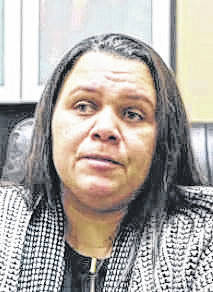Drug addiction program is saving Lumbee lives
PEMBROKE — Kevin Sampson would be dead if not for the Medication-Assisted Treatment Program implemented by the Lumbee Tribe of North Carolina.
The Pembroke man has been part of the program for four months, after a six-year battle with drug addiction that resulted in two overdoses.
“Some people it might take longer, some it might take less,” Sampson said. “I just can’t believe where I came from in the past four months.”
To address the opioid epidemic among American Indians, the Lumbee Tribe implemented the MAT Program in 2019 with the help of a $1.5 million Substance Abuse and Mental Health Services Administration grant from the N.C. Department of Health and Human Services to provide services over a three-year span. The program provides services to 63 Lumbee Tribe members within the tribal service area of Robeson, Cumberland, Scotland and Hoke counties each year.
“The Lumbee Tribe recognized that this is a crisis, this is an epidemic and it has been for several years,” said Erika Locklear, program director.
“I am happy that we have a staff that works daily to write grants such as the SAMHSA Grant, which is saving lives from opioid addiction in this county,” Tribal Chairman Harvey Godwin Jr. said.
The Lumbee Tribe has a great staff with compassion and empathy, he said. They know how to work with people with substance abuse problems, and their efforts saving more than 60 lives a year.
“Through the COVID-19 pandemic, it is even harder to help people with addiction,” Godwin said. “The Lumbee Tribe is multi-faceted as we work to help people. I am very proud of our staff who work daily to help people, whether by providing energy assistance, housing services such as rehabilitation, home ownership, down payment assistance, COVID-19 testing or providing food for families.
The tribe’s efforts certainly have affected Sampson’s family life.
“I can tell the joy in mother’s voice now that I’m back,” he said. “She’s even made the statement ‘Boy, I thought you were going to die out there.’”
Early in life, people would describe Sampson as being an “outstanding person,” he said. His “downfall” led him to heroine and fentanyl.
“I messed up my knee at work,” he said. “I went to the doctor and they started out giving me the pain pills… That’s where it started with me. That was my downfall.”
Sampson said because of how drug addiction is perceived in movies and television, people associate drug addiction to large cities.
“You’re like ‘Man these people are pitiful. Bless their heart,’ and then setting there one night it hits you like a ton of bricks “Hey, you’re doing this stuff,’” Sampson said.
Opioid addiction is not limited to pills, Locklear said. It also includes drugs like heroine, so when individuals are looking for a way out, the MAT Program is available to assist.
Some of the MAT services include support-group sessions, individual and group counseling, and medication treatment. The goal is to implement treatments that help people with substance use disorders achieve and maintain a meaningful and sustained recovery with lifetime lasting results.
When participants first enter the program, they go through an assessment with the clinic and if they qualify, they begin treatment. The services are free.
“During the day, I’ll call my clients just to see how they’re doing, make sure everything is going OK with them,” said Heather Carter, a MAT Program coordinator. “Some may have some anxiety or some depression that they’re going through, so I like to share different self-healing modalities that they can use.”
This could be deep breathing, meditation or simply taking off one’s shoes, sitting by the river and being grounded, she said.
One program graduate was motivated to go back to school and will graduate in May with an electrical degree, thanks to the program.
It’s stories like this that triggers the feelings of “joy” for Carter.
“It is a joy to my soul to see where they’re at when they come and then see where they’re at once they receive so many amounts of treatments and they begin their healing journey. It is beautiful and aspiring to me,” she said.
Sampson is now “back on track,” has a new job, insurance and is working to build back the trust he lost with some of his family.
“That helps a lot when you feel like somebody is in your corner,” Sampson said. “Jesus is the main one that’s in our corner. He’s gotcha no matter what but there are people that still care out there. There are people willingly, out of their heart, besides a job that want to help people. I’m so glad I found out about this program.”
To learn more about the MAT Program, call 910-522-5055. The facility is located at 204 West Third St. in Pembroke.
Tomeka Sinclair can be reached at [email protected] or 910-416-5865.


